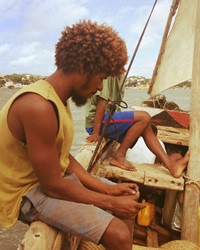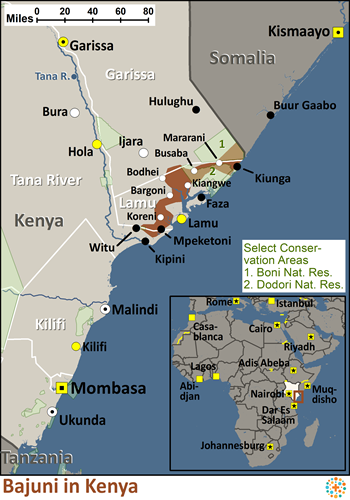The Bajuni are located primarily in the district of Lamu, Kenya on the coast of the Indian Ocean. In Kenya, one can find them in the city of Mombasa. They occupy the island of Lamu, just north of the Tana River. This tiny island is less than ten miles long and four miles wide. They are also reported to live in Tanzania. A smaller number live in the Bajuni islands of Somalia, but they are in the process of being driven out by the Somalis.
The Bajuni speak a language they call Tikuu, which is a form of Swahili. Although they are a mixture of Bantu, Somali and Arabs they still maintain themselves as a distinct cultural group.
The Bajuni evolved when Arab traders began coming to the coast of Kenya to trade and eventually settle. Over the decades, as the Arabs intermarried with the African population, a Muslim community grew. As time passed, the Arabs introduced their social structure to the family-oriented Africans.
Because the Bajuni live so near water, many make their living from the ocean. They generally have occupations that are connected with the sea. Many are fishermen, sailors, ocean merchants, shipbuilders and the like. Others are also involved in farming. Their main foods are coconut, fish and rice. This is limited by a lack of fresh water. Their daily routines are interrupted by prayer times, meals and an afternoon rest. Men are the breadwinners. A Muslim judge, or kadhi, handles the criminal and civil disputes of the community.
A Bajuni woman customarily leaves the house only to visit or to go to the market. Her visiting is done late in the afternoon when the housework is finished and the children are playing. The husbands like to gather at a men's meeting place or the mosque.
The men wear a kikoys, which is wrapped around the waist like a shirt, and rubber thongs. Bajuni women wear discreet black veils with only their eyes visible to the world.
Children stay at home until the age of six or seven, when they are sent to the Muslim school. In school, they learn to read the Koran and perform daily prayers. Children are always the first to speak as they greet an elder with a kiss on the right hand. A young person always stands to offer his seat when an older person enters a room and is always the last to eat.
Girls learn to cook starting at age 10. When she reaches puberty, she can no longer mix with boys outside of her family. Nor can she leave the home without an escort.
Almost all of the Bajuni are Shafite Muslims. Their lives revolve around the mosque and daily prayer. In the course of saying five prayers a day, they also wash at least five times. Every Muslim parent insists on giving his child a basic Islamic education. When a child is born, it is held up by the father, a friend or a teacher who recites the traditional call of prayer into its ear. From the moment of birth, the child is instructed in the basic teachings of Islam.
Although food is readily available to most Bajuni on the island, fresh water is not as easy to find. Water for drinking and cooking must sometimes be imported. Electricity, sewage systems and running water are almost non-existent on the island.
Though the Bible has been translated into Swahili and mission agencies have focused on the Bajuni, there are not that many Christ followers among them outside of Kenya.
Ask the Lord to call people to assist the Bajuni in improving their living conditions.
Pray that God will call out prayer teams to break up the soil through worship and intercession.
Pray for the Lord to give Bajuni people dreams and visions of Jesus Christ.
Pray that God will complete the work begun in the hearts of these believers through adequate discipleship.
Pray that Christ-centered discipleship will soon consume Bajuni communities in Africa.
Scripture Prayers for the Bajuni in Kenya.
https://en.wikipedia.org/wiki/Bajuni_people
https://www.101lasttribes.com/tribes/bajuni.html
https://www.aflat.org/files/dnurse/Bajuni.pdf
https://www.kenyageographic.com/bajuni/
| Profile Source: Joshua Project |


























